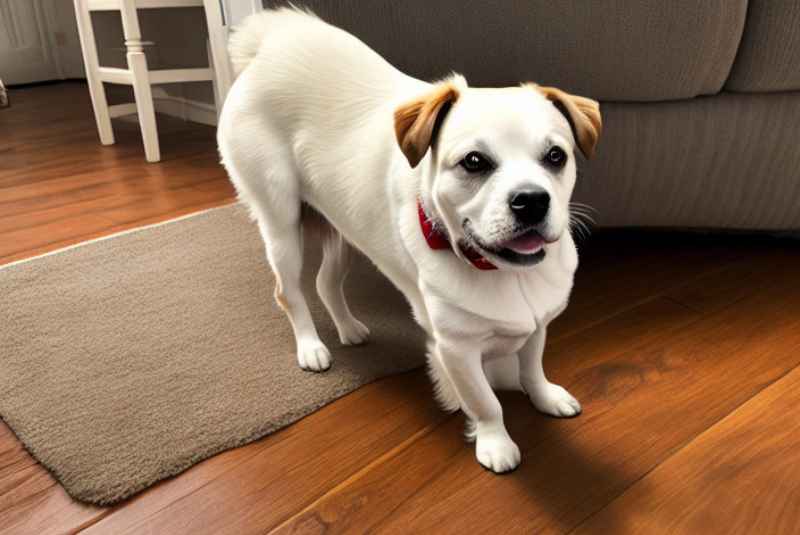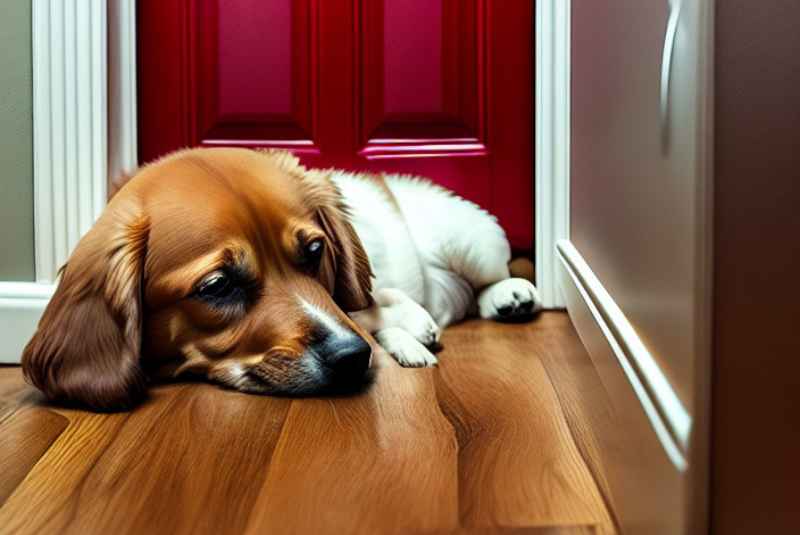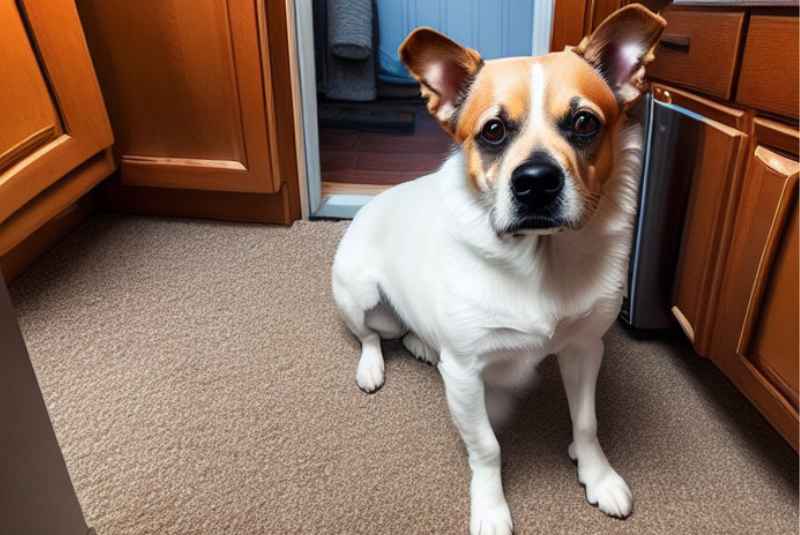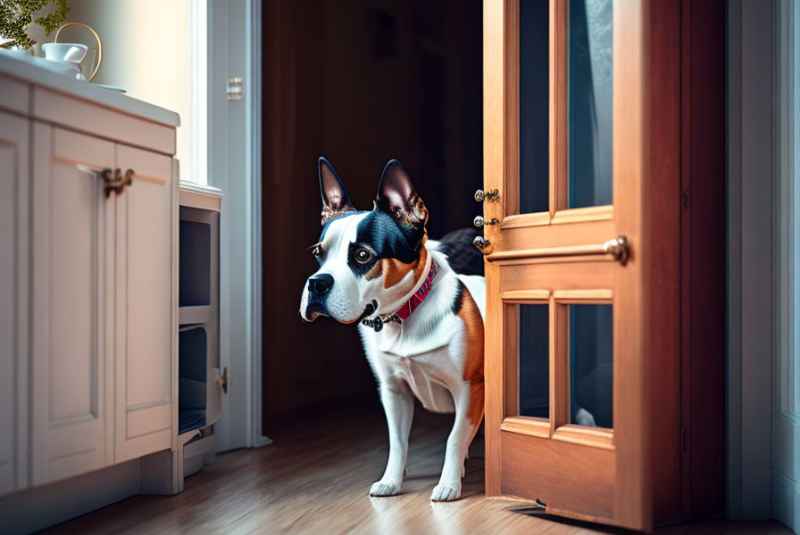If you’re a pet owner asking, “Why Is My Old Dog Peeing in the House?” you’ve probably had the irritating experience of finding pee stains in your home despite having a well-trained dog. This problem gets much more difficult when it involves an elderly dog with no prior training. In this post, we will look at the numerous reasons why your aging dog may be peeing in the house and offer advice on how to treat this habit.
Understanding Why Is My Old Dog Peeing in the House?
Older dogs, just like humans, go through physical and cognitive changes as they age. These changes can lead to a range of health issues and alterations in behavior, including house soiling.
Read Also: What To Do If My Dog Is Choking?
Health Issues and Urinary Incontinence
Health problems such as urinary tract infections, bladder stones, kidney disease, and hormonal imbalances can cause urinary incontinence in dogs. Incontinence refers to the loss of voluntary control over bladder function, leading to accidents in the house.
Changes in Routine and Environment
Dogs are creatures of habit, and any disruption in their routine or environment can cause stress and confusion. Why Is My Old Dog Peeing in the House? Changes such as moving to a new house, introducing new pets or family members, or alterations in their daily schedule can trigger anxiety and result in house soiling.
Cognitive Decline and Behavioral Changes

As dogs age, they may experience cognitive decline, similar to human dementia. This decline can affect their memory, learning abilities, and bladder control. Dogs with cognitive dysfunction syndrome (CDS) may forget their house training or have difficulty finding the appropriate place to eliminate.
Anxiety and Stress
Older dogs may develop anxiety or stress due to a variety of reasons, such as separation anxiety, fear of loud noises, or the loss of a companion. These emotional factors can lead to inappropriate elimination as a form of communication or coping mechanism.
Marking Territory
Both male and female dogs may engage in marking behavior, especially if Why Is My Old Dog Peeing in the House? They feel the need to establish or reaffirm their territory. This behavior can involve urinating on furniture, walls, or other objects within the house.
Insufficient House Training
Sometimes, the root cause of the problem lies in inadequate house training during the early stages of a dog’s life. If a dog wasn’t properly trained or had inconsistent training, it may not have learned the appropriate behavior for eliminating outside the house.
Inadequate Access to Outdoors
Older dogs may face physical limitations, such as arthritis or mobility issues, which can make it difficult for them to reach the outdoors in time for elimination. Lack of accessibility to the yard or longer distances to go outside may contribute to accidents indoors.
Social Factors and Loneliness

Dogs are social animals, and they thrive on companionship and social interaction. Why Is My Old Dog Peeing in the House? When left alone for extended periods or deprived of social stimulation, they may feel anxious or lonely, leading to housework as a response to distress.
Read Also: How To Clean Dog Teeth Without Brushing?
Environmental Factors
Certain environmental factors can contribute to a dog’s house-soiling behavior. These factors include a lack of suitable elimination areas, strong odors from previous accidents, or the presence of unfamiliar animals or their scents in the vicinity.
Addressing the Issue
Dealing with a dog peeing in the house requires a multifaceted approach that takes into account the specific underlying cause. Here are some strategies to consider:
- Consultation with a Veterinarian
If Why Is My Old Dog Peeing in the House? When someone starts peeing in the house, it’s essential to rule out any underlying health issues. A thorough examination by a veterinarian can help identify or eliminate medical conditions that may contribute to the behavior.
- Establishing a Routine
Creating a consistent routine for your dog can help them feel secure and reduce anxiety. Establish regular feeding times, play sessions, and walks. Additionally, maintain a consistent schedule for bathroom breaks to reinforce appropriate elimination behavior.
- Providing Adequate Opportunities for Elimination
Ensure that your dog has easy access to the appropriate elimination areas. Create a designated spot in the yard or provide indoor alternatives such as pee pads or artificial grass for dogs with limited mobility. This accessibility can prevent accidents and promote successful housetraining.

- Managing Anxiety and Stress
If anxiety or stress is the underlying cause of the house-soiling behavior, consider using techniques to manage and alleviate these emotions. Provide comfort items like toys or blankets, use calming aids if recommended by your vet, and create a soothing environment for your dog.
- Reinforcing Training and Positive Reinforcement
Revisit and reinforce basic housetraining techniques with your dog. Use positive reinforcement methods such as treats, praise, and rewards to encourage desired behaviors. Consistency and patience are keys to successful training.
Read Also On Quora: Why would an older dog pee in the house?
Conclusion
In the above, we discuss Why Is My Old Dog Peeing in the House? Older dogs peeing in the house can be a frustrating issue for pet owners, but understanding the possible reasons behind this behavior is crucial. By addressing health concerns, managing anxiety, providing proper training and routines, and creating a supportive environment, you can help your old dog overcome this problem and enjoy a comfortable and stress-free life.
Is house soiling in older dogs a normal part of aging?
No, house-soiling is not a normal part of aging. It is often a symptom of an underlying issue that requires attention.
Should I punish my dog for peeing in the house?
No, punishment can worsen the problem and cause anxiety in your dog. Positive reinforcement and consistent training are more effective methods.
Can urinary incontinence be treated in dogs?
Yes, urinary incontinence can often be managed through medication, surgery, or lifestyle changes recommended by a veterinarian.
How long does it take to housetrain an older dog?
The time it takes to housetrain an older dog can vary depending on the dog’s history and individual circumstances. Consistency, patience, and positive reinforcement are key factors in the training process.
Should I seek professional help if my dog continues to pee in the house despite my efforts?
If the problem persists, it is advisable to consult a veterinarian or a professional dog trainer for further guidance and assistance.
